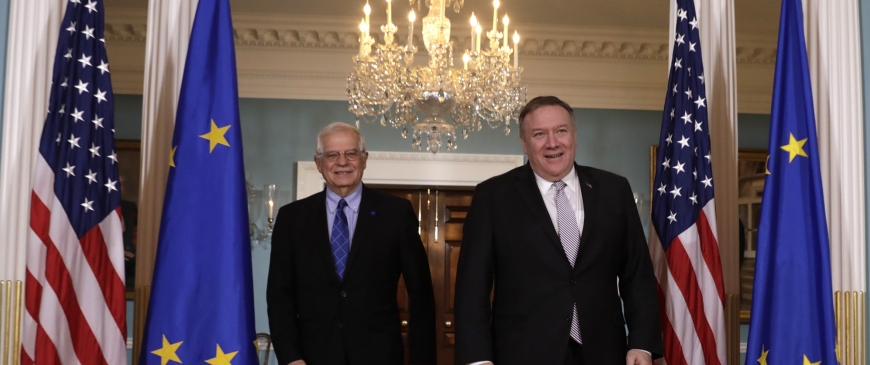
The EU's response to Trump's peace plan has been pitiful – it is time for the bloc to speak up
The EU’s foreign policy chief, Josep Borrell, has just returned from his first diplomatic visit to Washington. Behind closed doors, tense conversations have likely taken place with senior US officials, including secretary of state Mike Pompeo and Donald Trump’s senior-advisor-cum-son-in-law, Jared Kushner. The transatlantic relationship is under unprecedented strain. The latest stress test for Europe is Trump’s so-called “deal of the century” for Israel-Palestine, which Borrell has denounced.
Trump’s deal crystallises his administration’s policy towards the conflict: unconditional support for Israel while turning the screws on the Palestinians. It promises a “realistic two-state solution” while offering a one-state reality. It completely rejects the international consensus and contravenes decades of US and EU policy – redrawing the internationally agreed 1967 borders. It realises the wildest dreams of Israel’s far right, including the annexation of 30 per cent of the West Bank. It leaves a fragmented Palestinian entity, devoid of meaningful sovereignty or statehood. It anoints Jerusalem Israel’s capital; and allocates far-flung eastern neighbourhoods including a refugee camp as part of the occupied Palestinian territories. It sets a litany of conditions for Palestinian self-governance, of which Israel and the US are the ultimate arbiters.
Although the plan will probably never be implemented, it will embolden Israel to push ahead with the de jure annexation of the West Bank, and may come to shape the contours of a future settlement. Israel has pursued a policy of creeping annexation in the West Bank for decades, expanding its settlements. Prime Minister Benjamin Netanyahu wanted to begin formal annexation immediately, but after a warning from Kushner, he will wait until after the March election. De jure annexation would bring hundreds of thousands of Palestinians under Israeli jurisdiction, creating an indisputable one-state reality of unequal rights for two peoples.
The “peace plan” has already provoked violence. Mortar shells and other projectiles have been fired over from Gaza, and Israel has responded with air strikes on Hamas targets. Violent protests have erupted in the West Bank, with four Palestinians killed by the Israeli army, including three teenagers. Israeli soldiers were injured in three attacks in Jerusalem last week, with the army killing one perpetrator.
How, then, should the EU respond? The bloc’s initial response was weak: a promise to “study and assess” the plan. Individual member-states issued conflicting statements. Austria, France and Poland “welcomed” the plan, which Brexit Britain called a “serious proposal”. By contrast, Ireland expressed “grave concern” and Luxembourg issued a critical statement. This fractured response is symptomatic of the EU’s foreign policy predicament, where decisions require unanimity – which is often elusive. Hungary blocked a stronger unanimous statement by the EU-27 on the Trump plan, later coming out in support of it. Netanyahu has forged alliances with some central and eastern European member states, finding common ground in particular with Hungary’s populist Prime Minister, Viktor Orbán. But Borrell appears ready to find ways around the paralysis. Rather than abandoning the statement, he put one out on his own authority, saying that “steps towards annexation … could not pass unchallenged”. In an opinion piece on Saturday, he acknowledged Europe’s foreign policy divisions. The High Representative called for Europe to “embrace its power” and urged member-states not to use their vetoes to “weaken the Union”.
Statements are all very well, but Borrell should be careful not to fall into the trap of declaratory diplomacy like his predecessor, Federica Mogherini. The EU has plenty of leverage in the form of economic heft, large aid budgets, strong defence capabilities, and an extensive and experienced diplomatic service. In spite of, or perhaps even because of, the destructive position taken by the US, there are constructive steps Borrell can take to oppose Trump’s plan.
Borrell should capitalise on this moment of crisis to push for recognition of Palestine, with East Jerusalem as the capital of a future Palestinian state. He should encourage willing EU member-states to take action in smaller groups, circumventing the need for consensus – a format which has proved effective on the Iran nuclear deal and on Venezuela. Borrell could also revive the idea of a European Security Council – a forum for a small group of EU member-states plus the UK to discuss action.
Borrell should strengthen the EU’s policy of ‘differentiation’ between Israel proper and the territories occupied after 1967, which excludes the settlements from the benefits of the EU-Israel bilateral relationship. This means ensuring that businesses and entities in the settlements do not benefit from preferential access to European markets, institutions or programmes. The High Representative should also resist calls to deepen the relationship any further without progress on the peace process.
The occupied Palestinian territories' economy and democracy are in poor health – the economy is expected to slip into recession in 2020-2021, there have been no elections since 2006, and the institutions are in a dire state. Palestinian President Mahmoud Abbas is blocking reconciliation between the two main Palestinian political factions. Borrell should ensure that aid to the Palestinian Authority is conditioned upon progress towards reconciliation and democracy. He should also push to end Europe’s policy of no-contact with Hamas: contact will be essential for supporting reconciliation and national elections. The High Representative should apply pressure to Israel to relax its restrictions on access, movement and trade across the occupied Palestinian territories (as well as to Egypt and the Palestinian Authority in the case of Gaza) – which the World Bank attributes as the main cause of Palestine’s economic woes.
The EU cannot simply hunker down in the hope that Trump will disappear – he may well win another term. Europe has a crucial role to play in containing his destructive impulses. Without Europe, the one-state, unequal reality in Israel and the occupied Palestinian territories will harden. It is time for Europe to come out of hibernation.
Beth Oppenheim is a research fellow at the Centre for European Reform.
